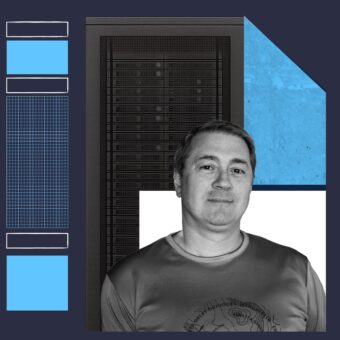
Cloud Operations and Enablement
Many organisations are still grappling with what cloud transformation means for them. At CID, we work with you to find the right balance of private, hyper-scaler and hybrid options. CID helps you build, manage, and optimise scalable, secure, and reliable cloud environments—ensuring you realise the full potential of your cloud and infrastructure investments.

The power of Cloud Operations and Enablement
Managing cloud infrastructure effectively requires specialised skills and strategic insight. Your operations need to be resilient, scalable and secure—balancing performance, cost efficiency and compliance at every turn. CID supports your journey by addressing the complexities of operating hybrid, private, or public cloud environments, ensuring smooth transitions and stable operations.
In our experience, organisations embracing cloud operations and enablement consistently achieve:
Improved reliability, resilience and uptime
Optimal configuration of compute, storage, and AI workloads
Stronger cybersecurity and compliance posture
More predictable and optimised cloud costs
Faster, more reliable deployments and continuous delivery (CI/CD)
Better resource scalability and flexibility to match demand
Enhanced visibility and transparency into cloud operations
Smart Accelerators for Cloud Operations and Enablement
Our Smart Accelerators support you to take small, tailored, efficient, no-risk steps towards your cloud operations goals. With our unique combination of business, technology and scientific expertise, we offer proven guidance, acting with execution in mind and a focus on delivery. Our Cloud Operations and Enablement framework has five main stages:
Thought Leadership
The “Cloud Transformation in Practice” thought leadership session offers IT and operations leaders strategic and practical guidance on modern cloud adoption.
After an overview of market trends, participants examine private vs. public vs. multi-cloud considerations and discover how structured assessments uncover operational inefficiencies.
The session highlights key offerings like Cloud Labs for hands-on learning, private cloud blueprints for robust architecture, and multi-cloud frameworks for cost governance, security, and automation.
Real-world case studies reveal performance gains and cost reductions, while interactive discussions address participant-specific needs.
It concludes with an exploration of emerging technologies such as Kubernetes, AI-driven management, and serverless solutions.
A final call to action invites deeper engagement and next steps, ensuring attendees depart with a clear roadmap and the confidence to begin—or refine—their own cloud transformation journeys.
- Client Roles: CIO, CTO, Lead Architect, Lead Technologist, business executives and sponsors, department heads, IT and software executives, other stakeholders
- CID Roles: Technology Evangelists, Session Facilitator
- Your time commitment: 1 or 2 days
Cloud Labs
Our current state analysis for Cloud Labs includes a client questionnaire, a 1-hour scoping call to define objectives, demo setup, and a detailed runbook. We also identify up- and cross-sell opportunities to tailor the live session for maximum relevance and strategic impact.
- Client Roles: CIO, CTO, Lead Architect, Lead Technologist
- CID Roles: Roles: Technology Evangelists, session facilitator
- Your time commitment: 1 day
The Cloud Labs live session offers an immersive, hands-on experience with middleware systems in a real-world environment. Participants explore infrastructure automation, performance optimisation, and sustainability tracking—without using customer data.
The session includes deep dives into compute, storage, and network operations, real-time monitoring, and tailored discussions on technologies.
- Client Roles: CIO, CTO, Lead Architect, Lead Technologist, operations and performance teams
- CID Roles: Technology Evangelists, session facilitator
- Your time commitment: 1 day
Our structured POC offering enables customers to test real-world workloads in an environment, delivering measurable results with or without using customer data.
With a defined test plan, performance and cost analysis, and live monitoring insights, the POC supports data-driven decision-making, accelerates project validation, and reduces risk ahead of full-scale deployment.
- Client Roles: Product or project owner
- CID Roles: Technology Evangelists
- Your time commitment: 2 days
The Assessment Report summariszes Live Session/Demo and POC findings, categoriszing essential vs. optional requirements and aligning technical, operational, and financial insights with business goals.
It provides a clear, structured roadmap for future planning, ensuring scalability, investment readiness, and a strong foundation for informed decision-making.
- Client Roles: CIO, CTO, Lead Architect, Lead Technologist, operations and performance teams, product or project owner
- CID Roles: Technology Evangelists
- Your time commitment: 1 day
Cloud Operations Optimisation
Our Current State Analysis begins with a fully answered questionnaire and a 7-day infrastructure analysis to capture real-world performance and resource utilisation. This analysis identifies bottlenecks and maps infrastructure usage to OPEX and CAPEX structures.
In a dedicated workshop, we review the operating model, uncover inefficiencies, and explore opportunities for optimization in compute, storage, networking, and automation.
The result is a structured Operating Model Assessment Report that aligns technical, financial, and operational insights—providing a clear roadmap for improving performance, reducing costs, and planning future infrastructure investments.
- Client Roles: CIOs, CTOs, Lead Architects, IT Finance Teams, Operations Teams
- CID Roles: Technology Evangelists, session facilitator
- Your time commitment: ~5 days
The Ideation phase builds on the Operating Model Assessment Report to identify pain points and optimisation opportunities across infrastructure, operations, and cost structures.
Using stakeholder input and monitoring data, we explore technical, financial, and process challenges—mapping them to OPEX and CAPEX dynamics.
In a dedicated workshop, we prioritise short-term wins and long-term initiatives, ensuring each recommendation aligns with business goals.
The result is a structured Optimiszation Report and roadmap that guides performance improvements, cost efficiency, and strategic IT modernisation.
- Client Roles: CIOs, CTOs, Lead Architects, IT Finance Teams, Operations Teams
- CID Roles: Technology Evangelists, session facilitator
- Your time commitment: 2 or 3 days
The Strategy Paper translates workshop findings into a clear, actionable execution plan.
After reviewing pain points, priorities, and performance data—including OPEX, CAPEX, and risk factors—we define measurable objectives, technical actions, and financial planning.
We deliver a phased roadmap with milestones, roles, and governance considerations.
The final Strategy Paper ensures leadership alignment and kick-starts implementation with confidence.
- Client Roles: CIOs, CTOs, Lead Architects, IT Finance Teams, Operations Teams
- CID Roles: Technology Evangelists
- Your time commitment: 2 days
Private Cloud Strategy and Design
We deliver a comprehensive status quo assessment to evaluate your organisation’s readiness for private cloud transformation. Using a structured workshop and detailed questionnaire, we assess current infrastructure, cloud readiness, and cost structures.
Focused on technologies, we identify architectural, operational, and financial gaps.
The result is an Assessment Report with clear findings, OPEX/CAPEX alignment, and a tailored roadmap for adopting a cloud-native operating model.
- Client Roles: CIOs, CTOs, Lead Architects, Cloud & Infrastructure Teams
- CID Roles: Technology Evangelists, session facilitator
- Your time commitment: 2 or 3 days
This phase translates assessment insights into a defined private cloud strategy through real-world demos and deep-dive sessions at CID’s Cloud Labs showroom.
A workshop enables organisations to validate technologies, explore architectural options, and conduct structured requirement engineering.
The result is a clear, actionable roadmap aligned with business goals, detailing technology selection, future-state design, and implementation strategy to support a successful private cloud transformation.
- Client Roles: CIOs, CTOs, Lead Architects, IT Operations, and Cloud Strategy Teams
- CID Roles: Technology Evangelists, session facilitator
- Your time commitment: 2 or 3 days
The Architecture Design phase transforms ideation insights into a technically validated, vendor-neutral blueprint for private cloud deployment.
It defines compute, storage, network, security, and automation architectures using various technologies.
The result is a deployment-ready design aligned with business priorities, including a clear execution roadmap, roles, and dependencies—enabling seamless implementation by CID or external teams.
- Client Roles: CIOs, CTOs, Lead Architects, Cloud & Infrastructure Teams
- CID Roles: Technology Evangelists
- Your time commitment: 1 day
The optional Proof of Concept (POC) validates the Architecture Design in a controlled environment before full-scale deployment.
Guided by a detailed Functional Test Plan, it tests key components, workloads, and success metrics across performance, scalability, security, and automation.
The POC mitigates risk, confirms technical feasibility, and provides real data to support confident, investment-ready decision-making.
A report outlines findings, gaps, and a Go/No-Go recommendation to ensure a seamless transition to implementation.
- Client Roles: CIOs, CTOs, Lead Architects, Cloud & Infrastructure Teams.
- CID Roles: Technology Evangelists, session facilitator
- Your time commitment: 1 or 2 days
The Private Cloud Implementation Blueprint defines a structured, execution-ready plan for deploying a cloud-native private cloud environment.
It begins with validating architectural decisions, infrastructure readiness, and financial feasibility (OPEX/CAPEX), followed by a detailed assessment of technical, operational, and security requirements.
The subsequent ideation phase transforms this blueprint into a hardware strategy, defining compute, storage, and network requirements and evaluating vendors using a structured scorecard.
The result is a validated deployment roadmap, ensuring alignment with business goals, risk mitigation, and a seamless transition from design to implementation.
- Client Roles: CIOs, CTOs, Lead Architects, IT Operations & Infrastructure Teams
- CID Roles: Technology Evangelists, session facilitator
- Your time commitment: 2 or 3 days
The final step delivers a fully structured, execution-ready Private Cloud Blueprint and Bill of Materials (BOM).
It includes validated hardware specifications, infrastructure sizing, and cost estimates aligned with OPEX and CAPEX targets.
CID ensures technical, financial, and operational alignment through detailed design, vendor recommendations, and a clear deployment roadmap—enabling seamless procurement, implementation, and scalability.
- Client Roles: CIOs, CTOs, Lead Architects, IT Procurement & Infrastructure Teams
- CID Roles: Technology Evangelists
- Your time commitment: 1 day
Multi-Cloud Strategy and Design
We deliver a comprehensive readiness assessment for hyper-scaler adoption (AWS, Azure, Google Cloud, etc.).
Through detailed analysis of infrastructure, workloads, cost structures, and security frameworks, we identify cloud feasibility, financial impact, and optimization opportunities.
The outcome is a structured cloud readiness assessment report with actionable insights and a roadmap for designing a scalable, secure, and cost-efficient multi-cloud architecture.
- Client Roles: CIOs, CTOs, Lead Architects, Cloud Strategy & Operations Teams
- CID Roles: Technology Evangelists, session facilitator
- Your time commitment: 1 or 2 days
We translate assessment insights into a structured multi-cloud strategy.
Through a focused workshop, we analyse costs, evaluate technology options, and identify synergies between private cloud and hyper-scaler platforms.
The session defines optimal workload placement, integration models, and governance strategies.
The outcome is a multi-cloud strategy report with a cost-benefit analysis, technology and vendor framework, and a clear roadmap for deployment—ensuring scalable, efficient, and risk-mitigated cloud adoption.
- Client Roles: CIOs, CTOs, Lead Architects, IT Operations, Cloud Strategy & Finance Teams
- CID Roles: Technology Evangelists, session facilitator
- Your time commitment: 1 or 2 days
The optional multi-cloud POC validates your strategy in a controlled environment by testing real workloads, cloud-native services, and integrations between private cloud and hyper-scalers.
Guided by a detailed functional test plan, it confirms performance, cost alignment, security, automation, and interoperability.
The POC reduces risk by identifying gaps early and provides a data-driven go/no-go decision, ensuring the selected architecture and services meet expectations before full deployment.
- Client Roles: CIOs, CTOs, Lead Architects, Cloud Operations, IT Security & Compliance Teams
- CID Roles: Technology Evangelists
- Your time commitment: 1 or 2 days
This phase translates ideation and POC insights into a structured target architecture, complete with a business case and operational scenarios.
It defines workload placement, cost structures (OPEX / CAPEX), and a secure, scalable multi-cloud design integrating private cloud and hyper-scaler environments.
The outcome includes a deployment-ready blueprint, financial strategy alignment, and an operational playbook—providing a clear, actionable framework for efficient and compliant multi-cloud implementation.
- Client Roles: CIOs, CTOs, Lead Architects, IT Finance, Operations & Security Teams
- CID Roles: Technology Evangelists, session facilitator
- Your time commitment: 1 or 2 days
This phase identifies a cloud-native workload suitable for full migration to a hyper-scaler (AWS, Azure, or Google Cloud), independent of private cloud or on-premises infrastructure.
It includes a detailed assessment of workload architecture, dependencies, cost implications, and cloud-native compatibility.
The outcome is a structured cloud workload suitability report with technical feasibility, financial modelling, and a roadmap for migration—enabling a smooth, secure, and cost-optimised transition to cloud-only operations.
- Client Roles: CIOs, CTOs, Cloud Architects, Application Owners, DevOps & Operations Teams
- CID Roles: Technology Evangelists, session facilitator
- Your time commitment: 1 or 2 days
We define a structured strategy for migrating workloads to a cloud-native hyper-scaler environment.
Through a focused workshop, we engineer resource requirements, evaluate cost models, compare AWS, Azure, and Google Cloud offerings, and assess migration complexity.
The outcome includes a resource requirement document, financial analysis, hyper-scaler selection, and a strategic roadmap—ensuring optimized deployment, operational readiness, and alignment with business, security, and compliance goals.
- Client Roles: CIOs, CTOs, Lead Architects, Cloud Strategy & Finance Teams, Application & DevOps Teams
- CID Roles: Technology Evangelists
- Your time commitment: 1 day
The blueprint creation phase delivers a structured execution plan for migrating workloads into a cloud-native hyper-scaler environment.
It includes a detailed technical architecture, cost model, and operational design, along with a Bill of Materials (BOM) or Statement of Work (SOW).
This blueprint ensures alignment with security, compliance, and automation best practices, while providing a clear roadmap and deployment strategy—enabling a seamless, efficient, and risk-mitigated transition to full cloud-native operations.
- Client Roles: CIOs, CTOs, Lead Architects, IT Finance & Procurement, Cloud Operations, DevOps & Security Teams
- CID Roles: Technology Evangelists
- Your time commitment: 1 day
Implementing your solution
We don’t just consult on and design digital products—we build them too. Our team are technology specialists with a range of expertise that spans the full spectrum of the digital value chain, from software engineering and cloud operations to data and AI.
Cloud-native software content
CID is a team of creative technologists who thrive in answering questions where the answers are not predetermined at the outset.

Explore the key organisational strategies for Cloud Native success, including DevOps culture, CI/CD, Infrastructure as Code, and Platform Engineering.

Cloud Native enables scalable, resilient software. Join our Tech Talk to explore key principles and strategies for successful adoption.

Discover key runtime considerations for building scalable Cloud Native applications. Learn how to optimize your cloud hosting strategy.
How we work
Smart Factory principles that deliver results
Our Smart Factory development philosophy is guided by six core principles. These principles inform the way we work with you—and ensure that we always deliver impactful solutions that exceed your expectations.
- Core principles
Our Smart Factory Principles underpin everything we do. - Our values
Discover the values that guide our unique approach.

Our other solutions
We are technology specialists with a broad and ever-expanding range of expert knowledge and skills. We have four other core pillars of expertise.

Explore CID’s use cases: VMware Optimization, Retail CX Intelligence and AI-powered chatbots. Practical guidance to cut costs, boost CX and drive growth

We take a holistic approach to cybersecurity, considering your company’s security as an integral part of its value creation—helping you to secure your assets and your customers’ trust.

At CID, we work with you to unlock the true benefits of cloud-native, bespoke software to achieve the performance, security, and AI-compatibility you need.

A state-of-the-art, interconnected data stack that advances data culture, system & AI integration, will bring the efficiency and insights you need.

Your digital backbone should reflect the singularity of your business to enhance productivity in the face of change.

Let’s talk
We’d love to hear about the challenges you’re looking to solve. Get in touch below or follow us on LinkedIn to keep up with our latest news and content.